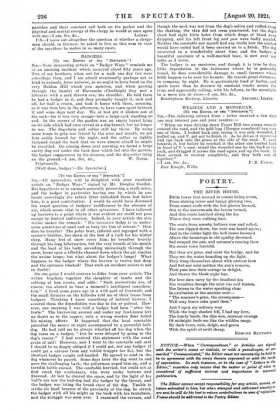(To vas EDITOR OF TEL " SPECTITOR."1
Sta,—All naturalists will be delighted with your excellent article on "Badger Ways" signed by Mr. Douglas Gordon. His hypothesis as to animals generally possessing a sixth sense, and the badger in particular having one by which ho can locate unerringly the rabbit litter embedded three feet below him, is a good contribution. I would he could have discussed the vexed question of badgers' indifference to the absence of air, which seems vital to all other spiratores. I have followed up burrows to a point where it was evident air could not pass except by limited infiltration. Indeed, in your article the able writer makes the remark : " His favourite dodge is to under- mine quantities of sand and so bury his line of retreat." How does he breathe? The polar bear, inflated and regorged with a season's blubber, lies down at the foot of a rock for his winter sleep. Many feet of snow cover him; he breathes heavily through his long hibernation, but the very breath of his mouth and the heat of his body, ascending unceasingly through the snow, keeps open a tubelike channel down which the air reaches the ursine lungs; but what about the badger's lungs? What happens to the badger where the burrow is twelve feet deep and the entrance blocked? That such an incident occurs is not in doubt !
On one point I would venture to differ from your article. The writer brackets together the slaughter of lambs and the robbing of hen roosts, and adds : " Such accusations are, of course, too absurd to bear a moment's intelligent considera- tion." I lived some years ago in a wild part of Cornwall, and the small farmers on the hillsides told me of their losses from badgers. Thinking I knew something of natural history, I assured them the depredation was due to fox or polecat. How- ever, one morning I was told a badger had been " after the fowls." The burrowing around and under my fowl-house left no doubt as to the sapper; only a strong wooden floor foiled his mining efforts. It happened that the local constable patrolled the moors at night accompanied by a powerful bull- dog. He had told me he always whistled off his dog when the dog came on a badger, " lest he were delayed by going to the dog's rescue." I had received this statement with the usual grain of salt ! However, now I went to the constable and said I should be so deeply obliged if I could get, not any badger (I could get a carcase from any rabbit trapper for is.), but the identical badger caught red-handed. He agreed to send in the dog whenever he passed. Some days later the dog went in and gave the challenging bark; the policeman urged him on, and a terrible battle ensued. The constable hurried, but could not at first reach the combatants, who were under battens and firewood. At last he cleared the. space, and by the light of his bull's eye saw the bull-dog had the badger by the throat, and the badger was biting the broad chest of the dog. Unable to strike its head because of the proximity of the dog, he struck the badger with all his might on the back with his truncheon, and the struggle was soon over. I examined the carcase, and
though the neck was wet from the dog's saliva and ruffled from the shaking, the skin did not seem punctured, but the dog's chest had eight little holes from which drops of blood were dripping, and his left front leg and paw were badly mauled. Neither the constable nor myself had any doubt how the combat would have ended had it been carried on to a finish. The dog recovered in a wonderfully short time, and the badger, a beautiful specimen of a well-marked boar, is now over my table as I write.
The badger is an omnivore, and though it is true he does little depredation in the fastnesses where he is generally found, he does considerable damage to small farmers whore fields happen to be near his haunts. He travels great distance', in company, by night. He is particularly fond of barley, and spoils more than he devours by constant tracks across the crop, and apparently rolling, with his fellows, in the moonlight in a mere joie de vivre.—I am, Sir, &c., Bassingham Rectory, Lincoln. A &LINDELL LEAFLET.


































 Previous page
Previous page